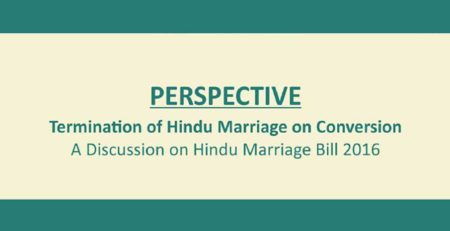The Law of Tawhin-i-Risalat: A Social, Political and Historical Perspective
Scriptural basis of the punishment
In support of the capital punishment for the offense of insulting or defiling the sacred name of the Prophet, the Islamic jurists have relied on the following verses of the Qur’ān:
i) The Qur’ān deals with the Prophet’s ultimatum to the idol‑worshipers of Arabia to vacate Makkah or accept Islam. Makkah fell to the Prophet in the 8th year after hijrah and was declared as the spiritual capital of Islam, the venue of its most important universal congregational worship – the hajj. The idol‑worshipers were allowed to stay as citizens. After one year, the first few verses of al-Taūbah were revealed in which a four month notice was given to the nonbelievers to vacate the city or accept Islam. The verse says:
{niftybox background=#F2F2F2}
But if they repent, establish regular prayers and pay poor‑due, they are your brothers in faith. Thus, We explained signs in detail for those who understand. But if they violate their oaths after their covenant and taunt you for your faith, then you fight the chief of the disbelievers because their oaths are nothing to them.6
{/niftybox}
In this verse, the Qur’ān refers to two offenses that justify fighting a people who commit them: first, violation of the covenant to repent, establish prayers and pay the zakah; and second, taunting the Muslims for their faith. Muslim scholars agree that a person using derogatory and libelous remarks against the Prophet or any of his essential teachings is punishable under this general instruction.7
ii) In the same chapter, the machinations of the hypocrites in Madinah have been described as molestation of the Prophet. Their mocking and idle‑talk against him were characterized as disbelief liable to punishment. Āyah 69 declares them as losers and their deeds fruitless in this world and in the life hereafter because of their mocking the Prophet. Muslim jurists rightly conclude that rendering all good deeds and actions fruitless in this world becomes meaningless if the act stays unpunished. A man who does not lose his life for this crime cannot lose the fruits of his actions and deeds, which according to this verse, he must. Al‑Ahzāb: 57 lays down the punishment:
Those who annoy and molest Allah and His messenger, Allah has cursed them in this world and in the hereafter, and He has prepared for them a humiliating punishment.8
{/niftybox}
According to the commentators of the Qur’ān, the divine curse in the life hereafter to those who annoy Allah and His messengers is easily understandable. Hell waits for such people. But the divine curse in this world becomes meaningless if there is no worldly punishment for the crime.9
iii) In surah al-Hashr, the exile and banishment of a group of the Jews of Madinah, namely, Banu al‑Nadīr has been mentioned which had taken place in the fourth year after hijrah. By signing the charter of Madinah, they had an agreement of citizenship with the Muslims. But they violated the charter by their conspiracies. They were punished by the Prophet (upon him be peace) and were eventually banished from the city. Commenting upon their evil deeds, the Qur’ān says:
{niftybox background=#F2F2F2}
And if Allah had not decreed banishment for them, He would have certainly punished them in this world and in the hereafter. They shall certainly have the punishment of the fire. This is because they opposed and resisted Allah and His messenger. For sure, whoever is opposed to Allah, is (for him) indeed, Allah is stern in reprisal.10
{/niftybox}
In this āyah, the act of opposing the Prophet makes one liable to punishment by Allah. Besides, it clarifies that this punishment was not executed in this world only because Allah had already decreed banishment for them.
{niftybox background=#F2F2F2}
iv) Surah al‑Mujādilah, describes their crime in these words:
Those who resist Allah and His messenger will be humbled to dust, as were those before them; for we have already sent down clear signs, and the unbelievers will have a humiliating penalty.11
{/niftybox}
In this āyah, even resistance to the Prophet has been declared an offense deserving humiliating punishment.
There are several other verses of the Qur’ān, which the jurists view as the basis of the punishment for insulting the Prophet. One may say here that al‑Taūbah: 64‑66 deals with a situation where a group was ridiculing the Prophet in their gatherings, presumably in private. There was no occasion whereby the feelings of any Muslim were outraged or incited. In conclusion, one may say that in order to constitute the crime of insulting the Prophet or defiling his sacred name, it is not essential that the offender should have committed it with the intent to provoke, incite or outrage the Muslim feelings. Once the insult is established, the offender will receive punishment irrespective of his motive.12
However, while determining whether an act constituted insult or not, the intention of the person involved will be considered, especially where the words used are not express. Thus, intention is crucial in determining insult to the Prophet’s name. While discussing this basic ingredient of the crime, Ibn Taymiyah has relied on an incident in which three companions, Hassān ibn Thābit, Mistah and Hamnah, were awarded punishment for qadhf (false accusation) against the Prophet’s wife. None of them had insulted the Prophet and hence no capital punishment was given.13 Ibn Taymiyah has also said that the incident took place before the revelation of the Qur’ānic āyah (33:6) in which the Prophet’s wives, were declared “mothers of the believers” meaning thereby that in future any false accusation against them will be treated as insult to the Prophet.14
Apart from these Qur’ānic āyahs, there have been several incidents during the Prophet’s life when the companions killed the persons found guilty of insulting him, and he upheld their action. History has preserved four or five such incidents. Ibn Taymiyah discusses at length such cases in his masterpiece on the subject, al‑Sarim al‑Maslūl. The nutshell of all the incidents is that certain individuals used to insult the Prophet. The Muslims tolerated for a while but when they perceived mischief, they killed them. In all these cases, the Prophet (upon him be peace) did not initiate any proceeding against the companions involved in their killing.
On the basis of these authorities, the unanimously held view of all Muslim jurists down the ages had been that any person, Muslim or non‑Muslim, who reviles the name, insults or ridicules the Prophet qualifies himself for execution. The insult or contempt of the Prophet, it was held, amounts to high treason against the Islamic state and the Muslim community.
According to many jurists of the Shafi‘iyah and Hanafiyah schools, a non‑Muslim citizen who insults the Prophet loses his rights as a citizen of the Islamic state as soon as the offense is proved. All his rights and privileges will be withdrawn, and he qualifies himself for execution. Some other jurists agree with this view in so far as it relates to a Muslim, but in respect of a non‑Muslim, their view is that the insult committed by him would not deprive him of his rights and privileges as a citizen, though he shall receive capital punishment.15






